Cybersecurity has always been a race between defenders and attackers, but by 2026 that race has clearly exposed the limits of passwords. Passwords remain one of the most common points of failure in modern breaches, not because users are careless, but because the model itself is outdated. Simple passwords are trivial to crack, complex ones are impossible to remember, and reused credentials continue to fuel phishing and account takeover attacks at scale.
Despite this, most organizations still rely heavily on passwords because replacing them is hard. Decades of legacy infrastructure, older applications, and identity systems were built around shared secrets. Untangling those dependencies takes time, coordination, and cultural change, which is why passwordless adoption has historically moved slower than the threat landscape.
Passkeys have emerged as the first broadly viable alternative. Instead of something you know, passkeys rely on something you have and something you are. Authentication happens locally on a trusted device using biometrics or a device PIN, while cryptographic keys ensure credentials never leave the device. Even if attackers trick a user, there is nothing reusable to steal. This fundamentally breaks phishing as an attack vector.
By 2026 passkeys are no longer experimental. Major platform vendors have aligned on FIDO standards, operating systems support passkeys natively, and real-world incidents have shown that FIDO-based authentication can stop even sophisticated credential attacks that bypass traditional MFA. The remaining challenge is not whether passkeys work, but how organizations deploy them across customers, employees, and legacy systems without breaking workflows.
1. Authsignal
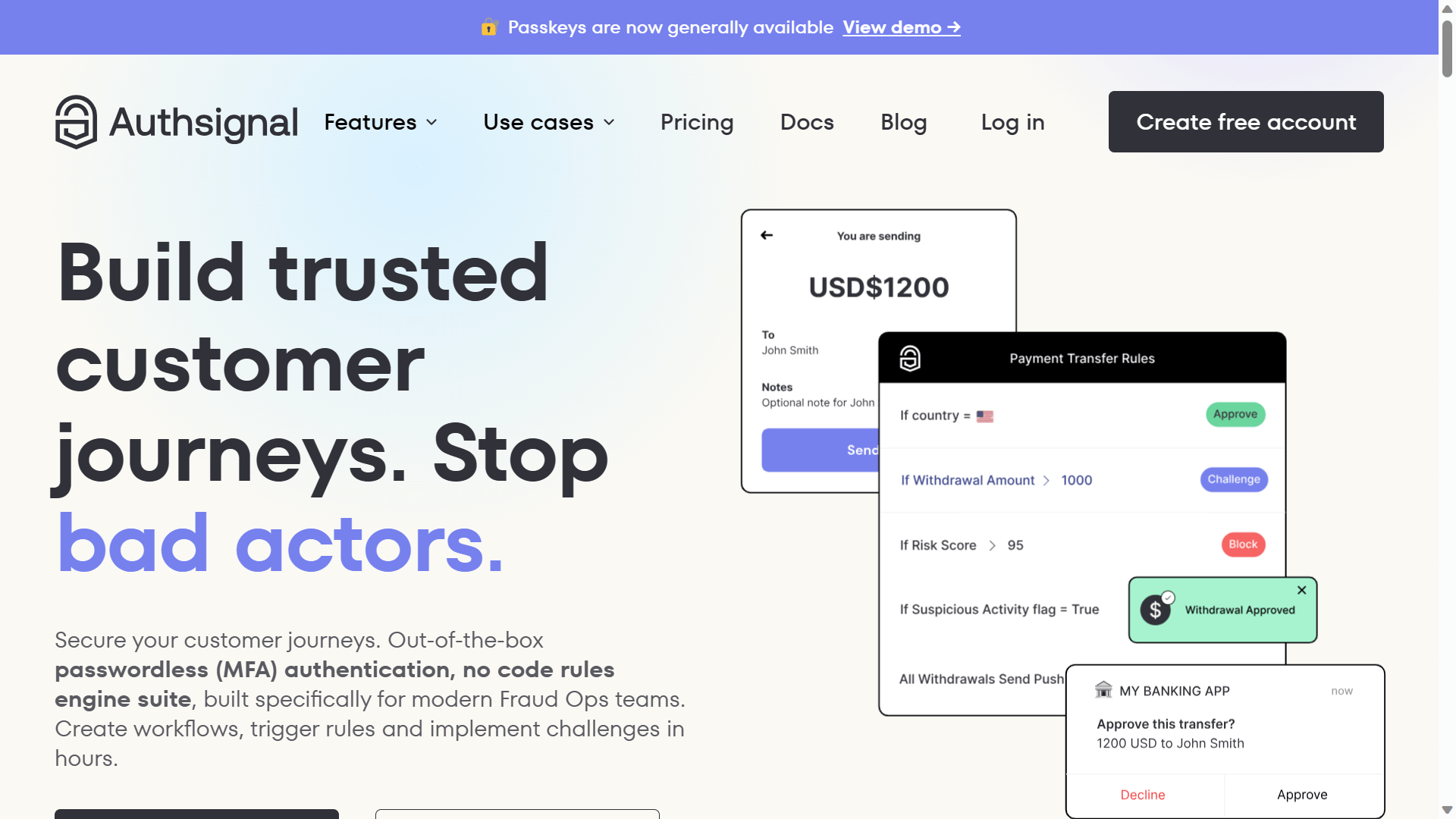
Authsignal is one of the leading pioneers in the identity and authentication space, enabling businesses to adopt Passkeys in 2023. Based out of Auckland, New Zealand, the company has been consistently innovating in the passkey and customer authentication space since 2021. Their goal is to make it easier for businesses to build secure customer journeys and drop authentication into customer flows to enable customers to mitigate fraud and deliver a unified customer authentication experience.
Authsignal's out-of-the-box, no-code rules solution allows customers to secure their most complex customer journeys. It also supports integrating custom data points from existing identity platforms like Azure AD B2C, ForgeRock, Ping and more. Product teams can easily deploy adaptive MFA authentication and analyse behavioural patterns to improve security. Some of the methods they use to ensure security are passkeys, push notifications, one-time SMS passwords that are specific to your device, and biometric scanning from devices to authentication identity.
Authsignal offers a range of plug-in integrations with other platforms, such as Auth0, Twilio, MessageBird, and more, to improve the utility of its offering. You can easily create a free account to get started, and if you want to play around with the tools they offer, you can easily set up a free demo to get to grips with what they offer. Their advanced customer insights and world-class UX ensure that you will be completely satisfied with your security experience. Easily streamline your Fraud Prevention operations and protect your users with the leading provider of passkeys and passwordless MFA.
2. AuthID
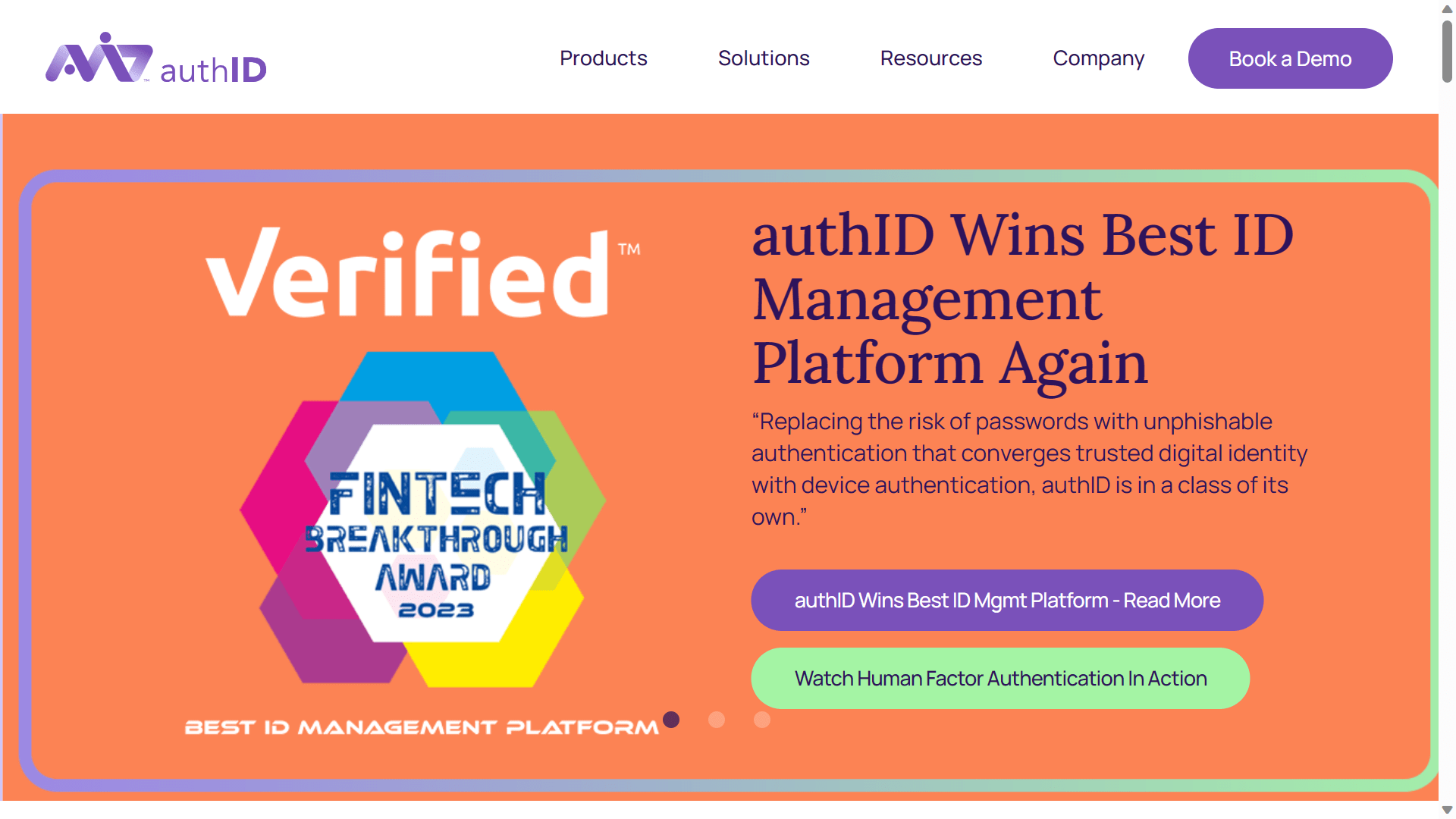
AuthID is an American cybersecurity company that was founded in 2011 and is currently based in the city of Denver. It is one of many leading experts that have identified that the use of passwords is one of the biggest cybersecurity detriments worldwide. AuthID has developed their own passwordless authentication system that is based on the FIDO principles and makes it much more difficult for phishing attacks to succeed in their efforts with their passkey tools.
AuthID's offering blends multiple MFA procedures, such as the use of a device-level passkey to gain entry into the system, coupled with biometric authentication that ensures that the person using the device to gain access, is in fact the account holder. Cryptographic security is also used to improve the overall quality of their security processes. This also helps to reduce the associated costs with password resets and security breaches.
AuthID also offers authentication services for the transfer of funds between accounts, online chat user verification and more. Their main customers are involved in the crypto, healthcare and financial services market where user security and information security is paramount.
3. Yubico
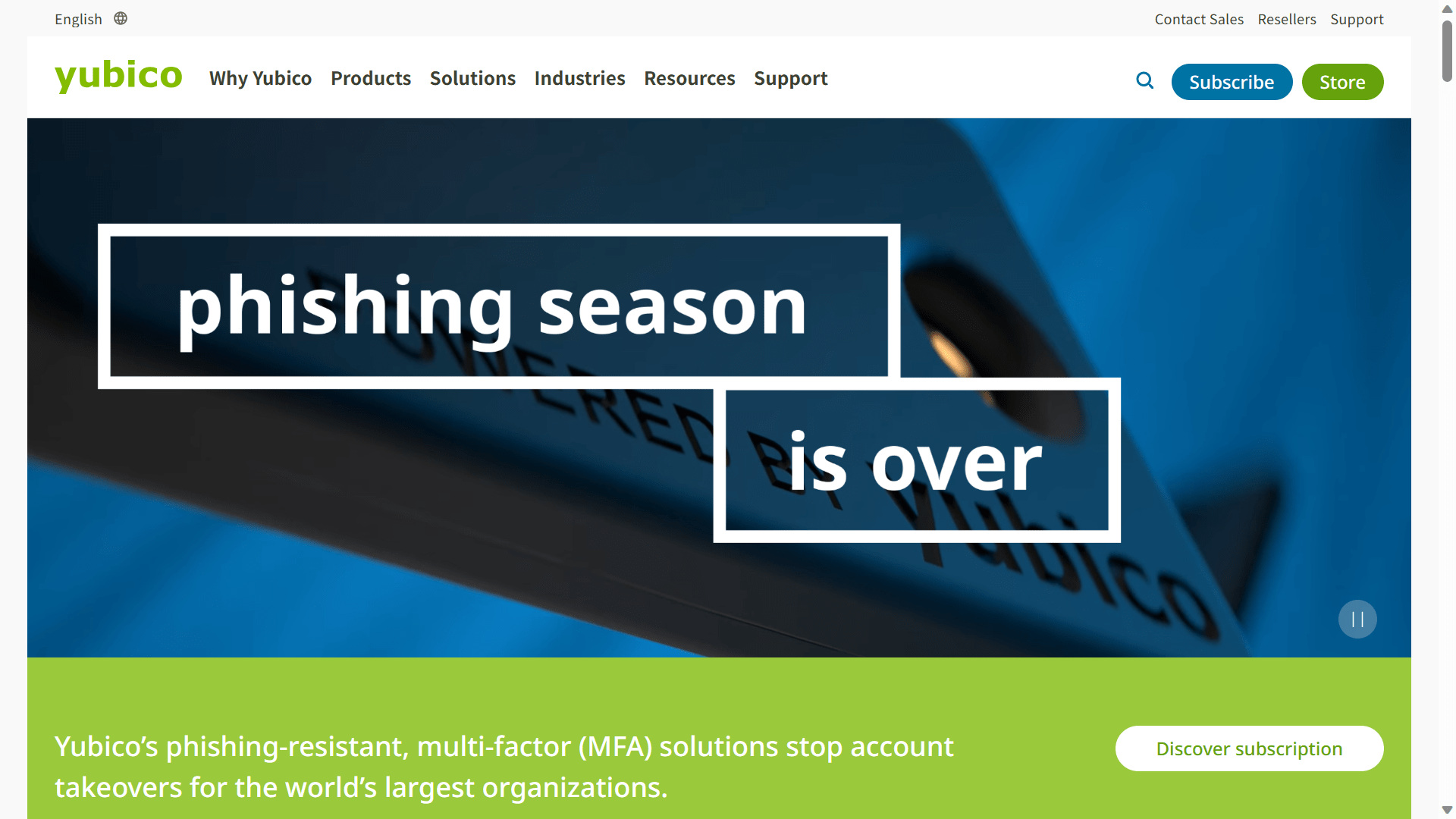
Yubico is a cybersecurity company that was founded in 2007 and is currently based in the city of Santa Clara. It offers a range of solutions to their customers which helps them to improve their security online. One of these solutions is for passwordless account logins, which the company has been heavily working on since the FIDO framework was announced.
There are multiple ways in which Yubico users can get access to passwordless authentication. Some of these methods include a scannable smart card which can be used to access networks and devices, a FIDO-based system which uses device level authentication and biometrics to improve security, this is becoming particularly attractive for cloud-based organisations.
Yubico is most well-known however, for its physical security products. These are hardware authenticator keys which replace passwords and can also be used in conjunction with other methods such as pin codes to improve the security of a range of transactions, such as finance and securing prescriptions.
4. Beyond Identity
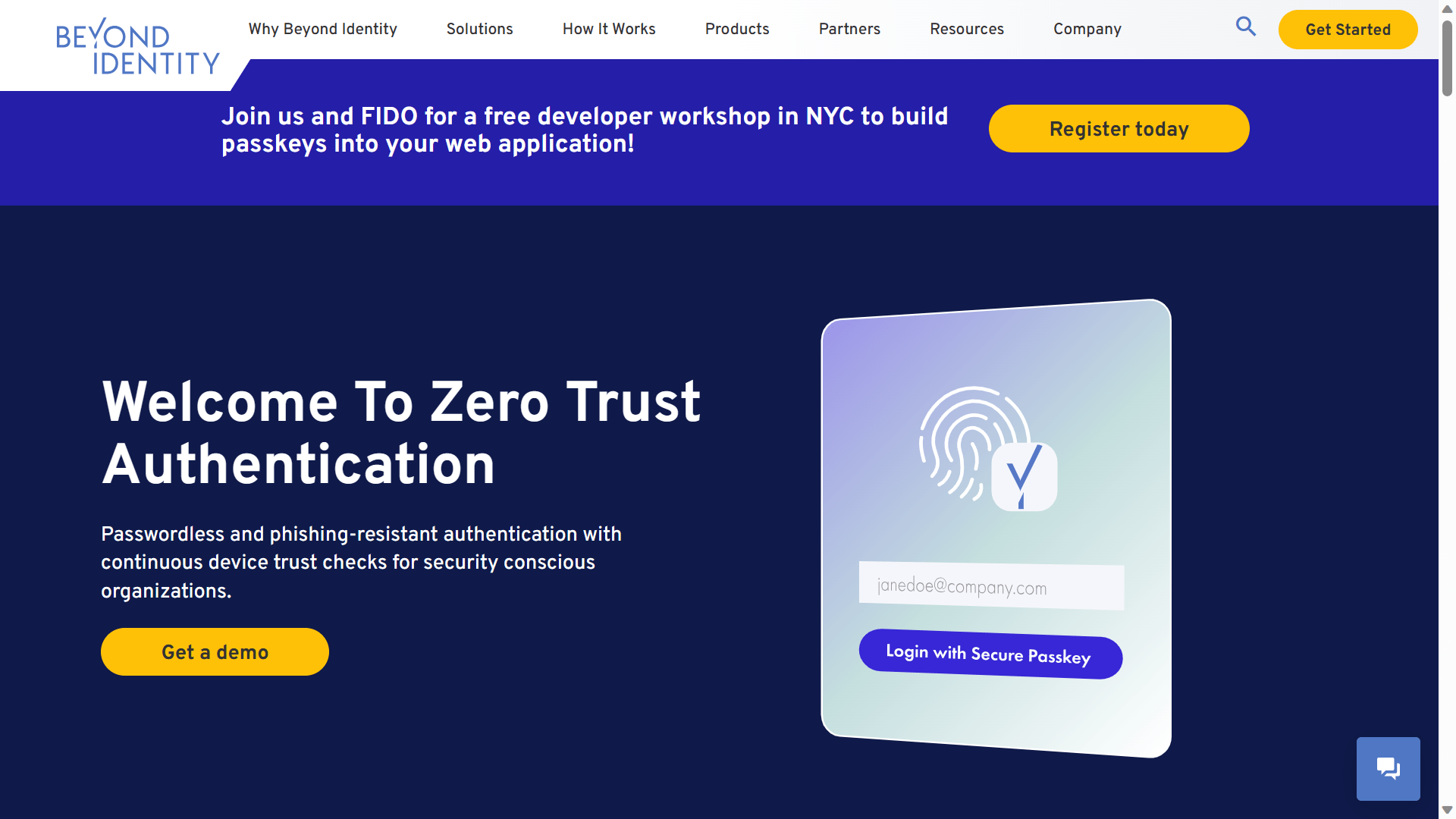
Beyond Identity is a cybersecurity startup that was founded in 2020 and is currently based in New York, USA. It aims to solve the problem that exists, whereby the majority of phishing and cyber attacks come from the use of credentials that have been previously compromised, a figure of around 80%. Beyond Identity aims to eliminate this risk through providing solutions for passwordless login that make use of device-level passkeys, regular device security checks and biometric data and pin codes to prevent unwarranted access.
On top of the issues created through cybersecurity risks, the use of passwordless logins also provides greater efficiency for businesses. For example, password resets are one of the most costly and common IT service desk problems. With the use of their MFA technology, users don't have to worry about remembering their passwords and going through the process of a reset if they can't remember it.
Beyond Identity supports a large number of integrations so you can unify your cybersecurity experience. For example, existing integrations include support for other identity management and security platforms like CyberArk, Forgerock and more. Beyond Identity also integrates easily with AWS and Google Workspace to create a convenient user experience.
5. HYPR
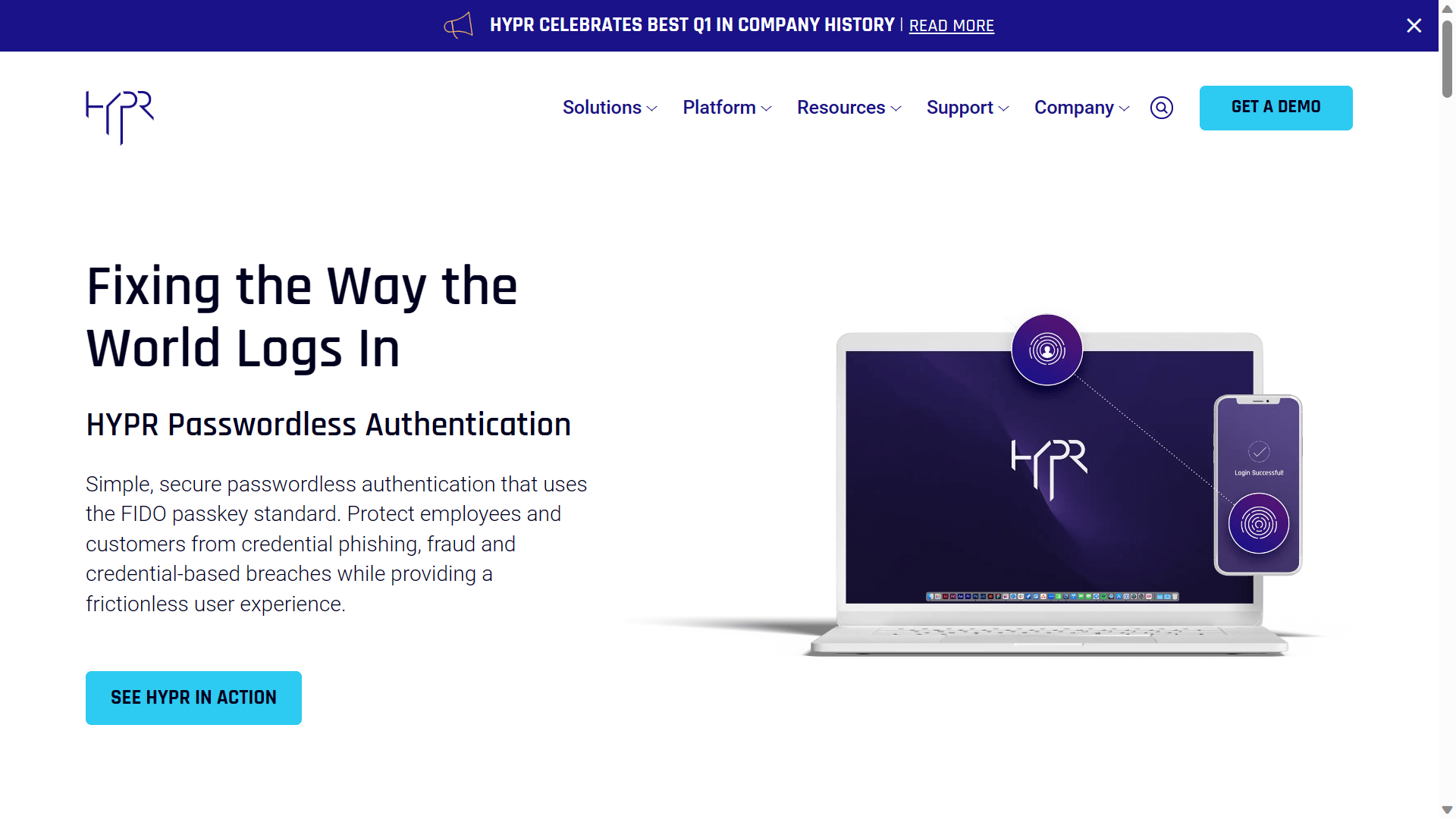
HYPR prevents phishing-based attacks on your infrastructure through the use of a passkey tool that integrates with Microsoft Azure. This tool allows for deployment across cloud and desktop environments, meaning that you can get full coverage within your organization much more easily and provides robust protection comparable to hardware keys, without the associated costs and complex implementation.
The app of the same name, which has been developed by HYPR, stores a device level private key on your phone and an open public key on your network, which allows you to login without the use of a password. Because the key for your login is embedded in your device itself, the ability for hackers to get the information they need to launch an attack is greatly reduced. Authentication on your device is done in the same way as unlocking your device, you can provide a face scan, fingerprint or a pin code to get access.
HYPR also provides a range of other solutions that minimise the use of passwords within an organization. One interesting feature is Offline Mode, which unlike many other MFA providers, allows you to access your workstation securely, even when you're not connected to the internet. This feature is native to the downloadable HYPR app.
6. LoginID
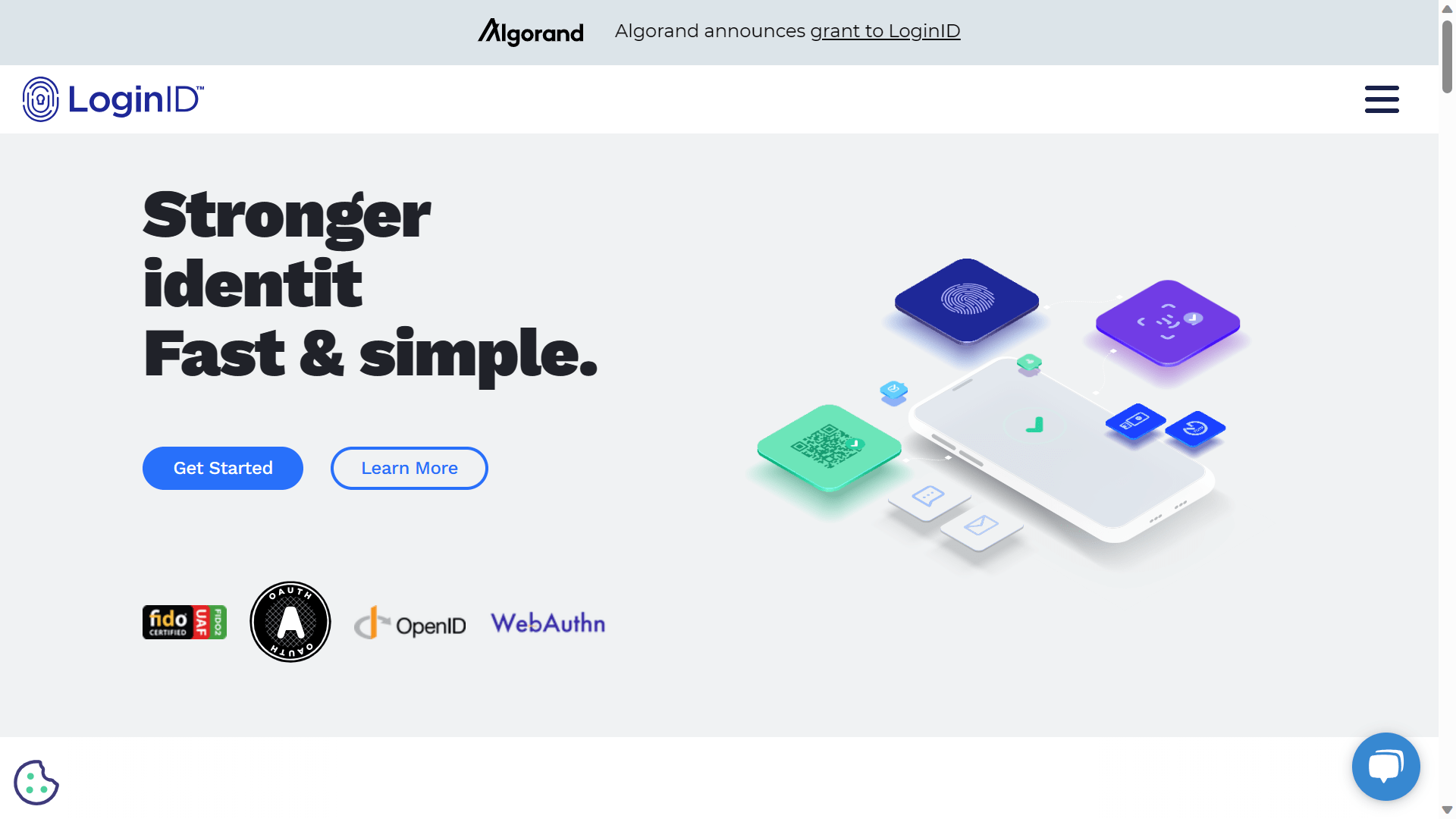
LoginID is an American startup that was founded in 2019 and is currently based in the city of San Mateo. It offers a range of cybersecurity services, including solutions for legacy security systems and more modern security solutions, such as passwordless MFA to decrease security risks for their customers. Their solutions work across a majority of major browsers and are also designed to work with every major operating system on the market, including iOS, Windows, Android and Mac OS.
LoginID's MFA solutions utilise passwordless technology to diminish the likelihood of an attack being successful. The process of setting up their technology in your existing tech stack is easy, which also makes the process of testing and launching your new MFA service easier than ever before. There's no need to install any apps or use any passwords on your device, as all of their solutions are device agnostic.
Some of the methods they use to keep things passwordless are one-time passwords delivered using voice and SMS, one time password apps, device passkeys and recovery codes in the case of an account being lost. You're also easily able to customise aspects of your brand attributes and UI to provide a better overall experience.
7. Ping Identity
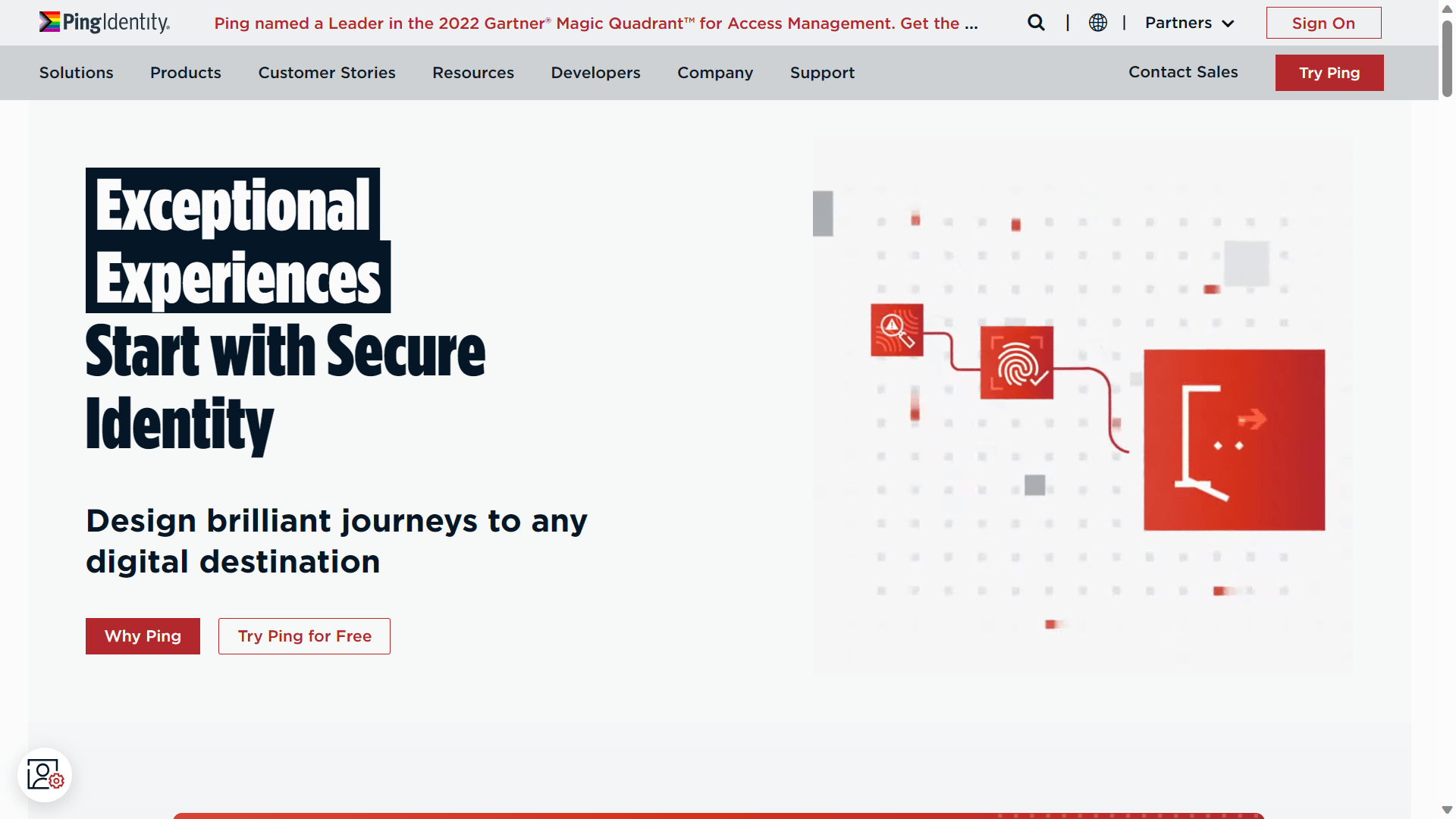
Ping Identity is an American cybersecurity company that was founded in 2007 and is currently based in Denver. It offers a wide range of solutions for cybersecurity and digital management, including cloud migration services, decentralized identity tools, online fraud prevention and much more. Ping Identity is also at the forefront of development in passwordless authentication.
Ping Identity has identified that passwords are one of the biggest security vulnerabilities that most modern companies face and they also realised that they provide a lot of friction for both your employees and your customers. To defeat these problems, the company has innovated solutions for MFA and Single Sign On to limit your password footprint and therefore reduce the likelihood of an attack through password vulnerabilities.
Not only do these tools decrease the likelihood of your business suffering a cyberattack, it also makes your internal processes and your employees much more efficient. This is achieved because your employees will spend less time trying to remember passwords, using password resets and taking up precious IT resources. Instead, employees are able to quickly and easily log on and get straight to work.
8. IDmelon
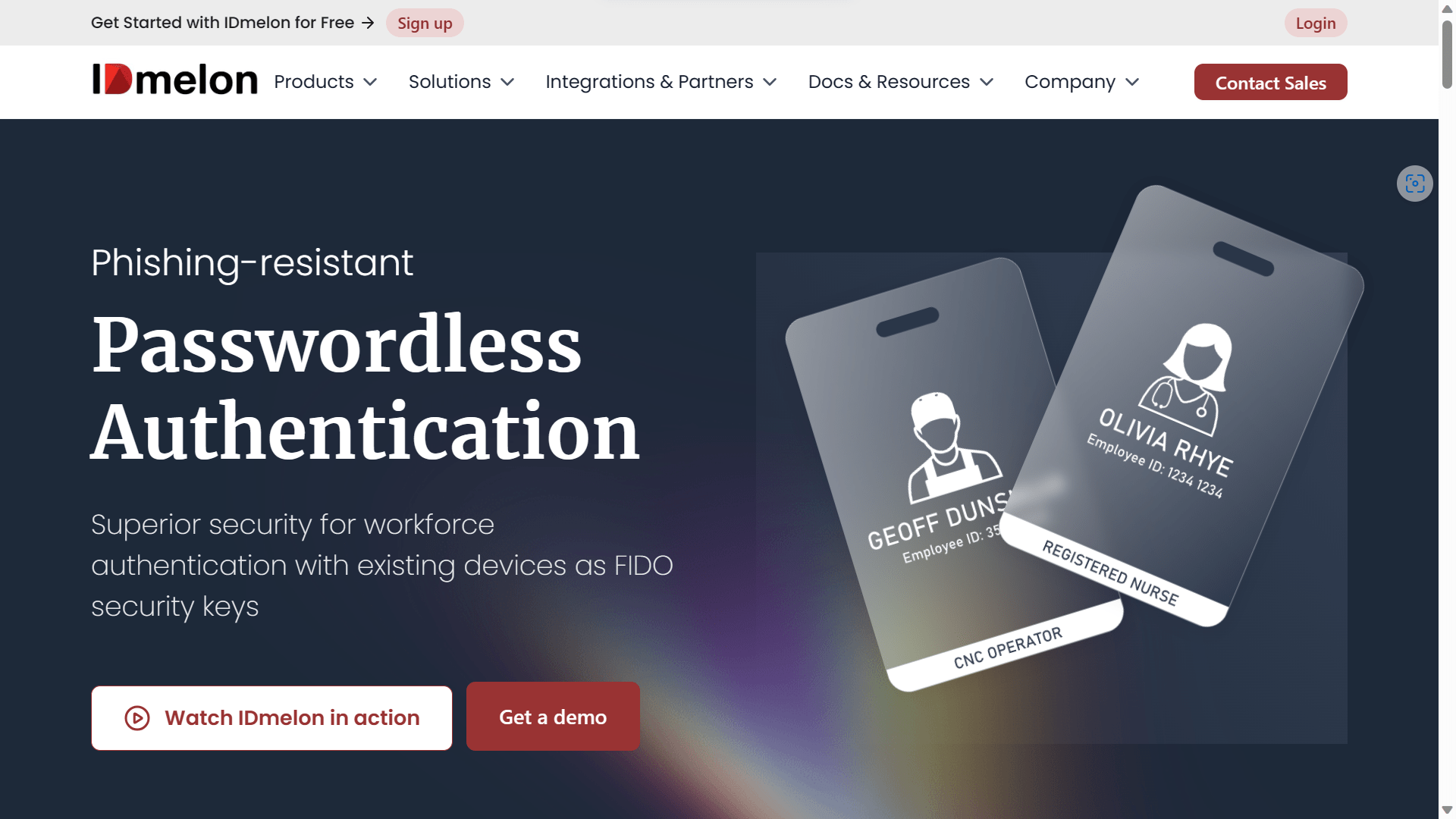
IDmelon is another example of a company that makes use of passkey tools, in an effort to reduce reliance on passwords and improve consumer safety online for enterprises. Founded in 2019 and based in Vancouver, the Canadian cyber security firm authenticates user identity for businesses through the use of FIDO-based security tokens. Users of their software can also select specific usage policies, depending on the type of device used, location and time windows which provides greater visibility and control over security.
IDmelon's platform allows users to access the applications they need with a single tap, instead of using a lengthy and insecure process of using usernames and passwords. For office-based workers, the company also provides a solution for scannable digital ID cards which allows employees to tap their ID cards and log into their devices and applications easily and securely.
IDmelon's software supports a variety of integrations with other platforms, such as Microsoft Office 365, Google Workspace and a range of cybersecurity solutions. This allows you to create a unified identity environment that promotes better efficiency and reduces the risk of a successful cyberattack. These integrations improve the user experience and make for an easier set up process in the beginning stages of using the software.
9. Entrust
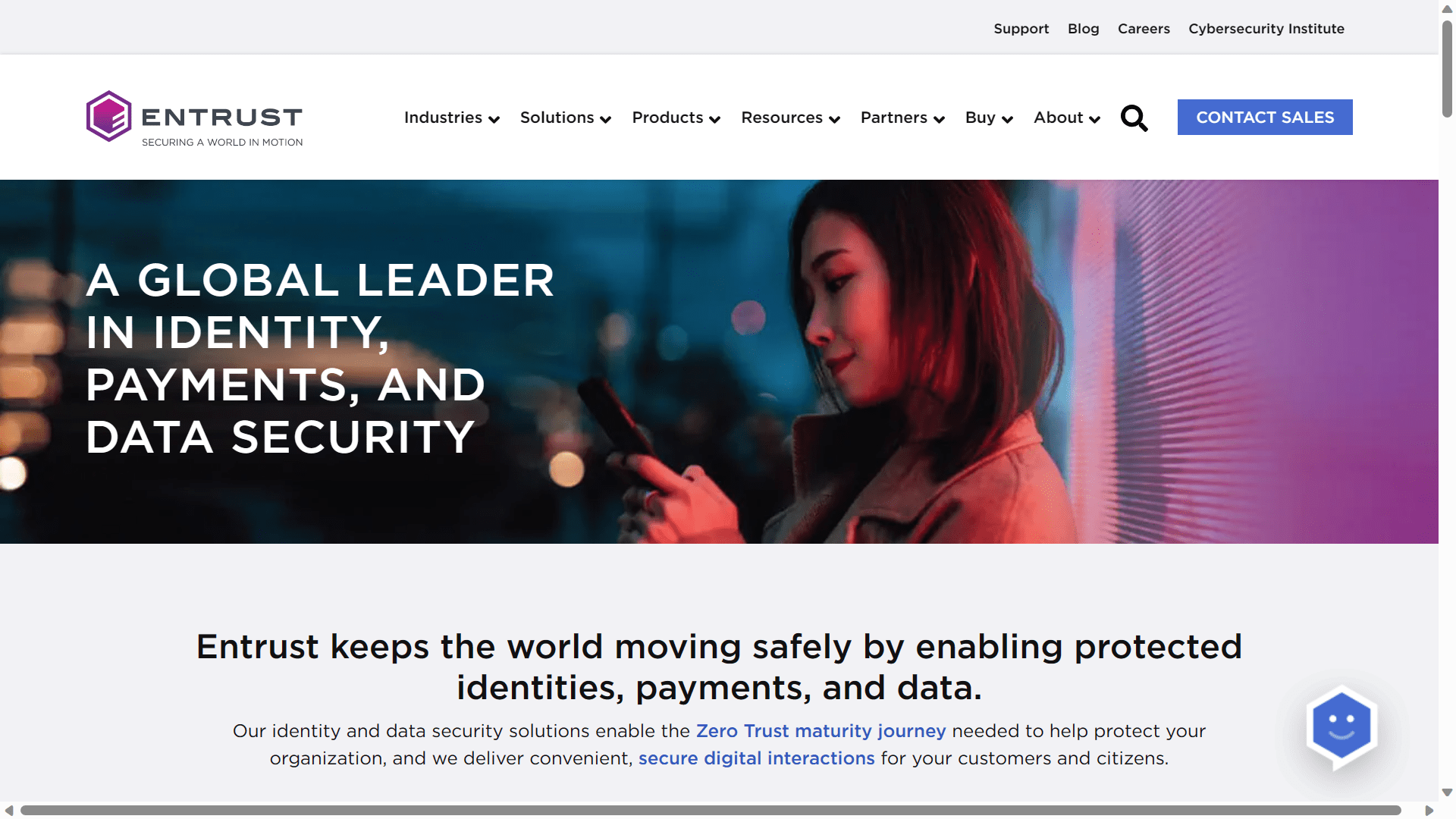
Entrust is a cybersecurity company based in the US, that was founded in 1994 and predominantly provides cybersecurity assistance to businesses in the financial sector, governments and other enterprise-level businesses. Entrust deals with a large volume of transactions each day and looks after the identities of more than 100 Million employees and customers across the world through what they do.
Entrust's solutions for passwordless MFA allow you and your employees to easily log into their networks, applications and devices easily, quickly and safely. This allows you to have better security for your networks, happier users as it's easier for them to log in safely.
If you're a little unsure about whether their solutions are right for you, you can get access to a demo of their platform so you can tinker with it and identify if it suits your needs. If you go through the demo and want to try a more specific solution, you can also access a free trial of their services, which gives you more functionality and a better idea if it's what you need.
10. Thales
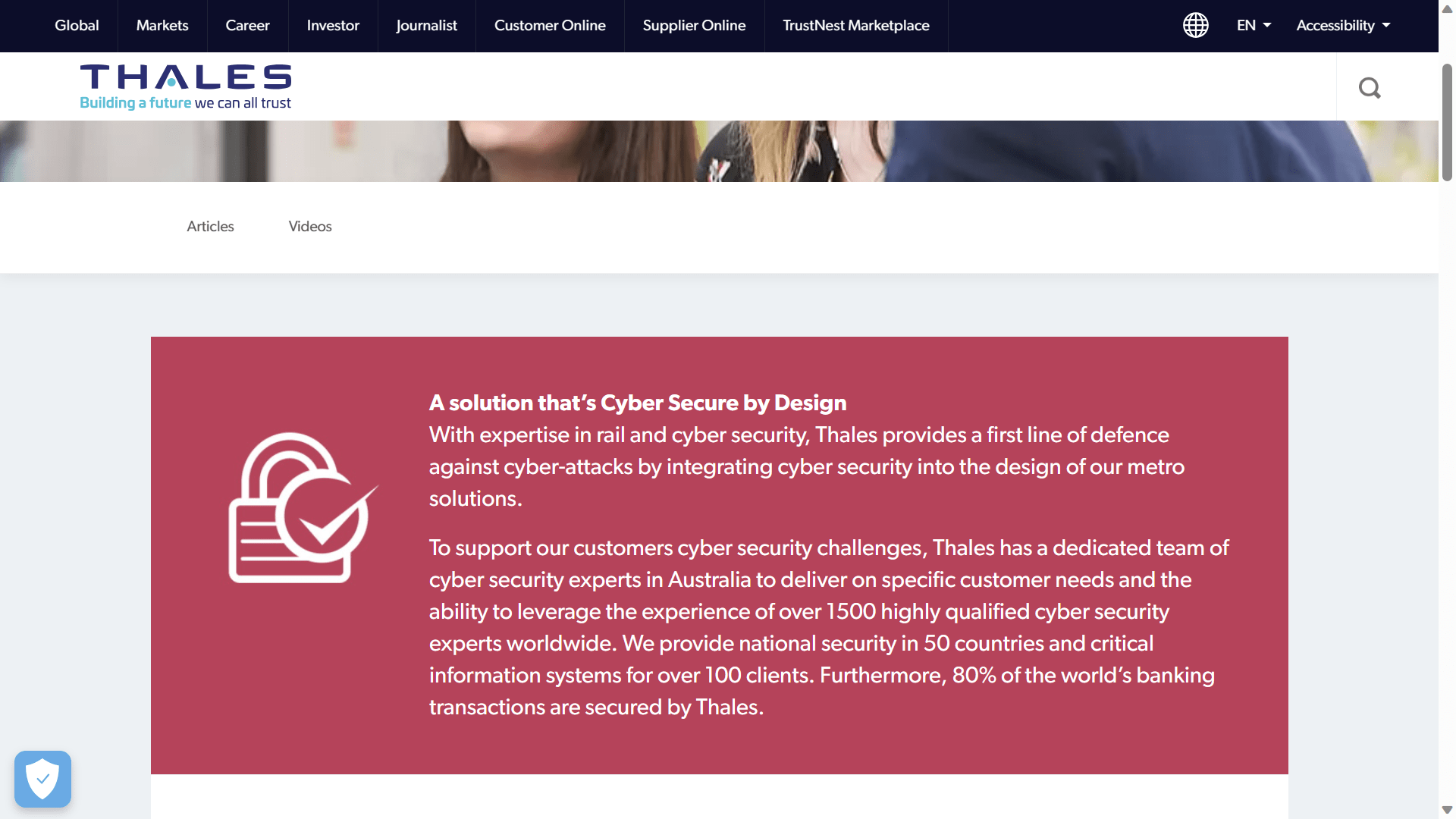
Thales is a French company that is heavily involved in the cybersecurity market and was founded in 2000, maintaining a headquarters in Austin, USA. Thales has been an early proponent and adopter of passwordless authentication in line with the FIDO framework, introducing it in 2020. Since then, it has been consistently updating and improving its passwordless offering to stay ahead of the competition.
Users of Thales are able to rapidly remove passwords from their security system and replace them with more secure methods, blending a variety of different methods to support each different use case. Some of these methods include a mix of biometric access, such as face scans, SSO and digital signatures that are binded to your specific device, which makes an attack much less likely.
Conclusion
A common concern among clinicians is whether AI medical scribes can truly understand clinical nuance and medical context. In 2026, the answer is increasingly clear. With advances in large language models trained on clinical data, modern scribe platforms are capable of producing accurate, structured, and context-aware documentation at scale.
Leading AI medical scribes are now trusted to handle complex terminology, specialty-specific workflows, and evolving care models. When implemented correctly, they deliver measurable improvements across clinical operations.
In practice, AI medical scribes help organizations:
Reduce administrative workload for clinicians
Decrease burnout and improve work life balance
Increase patient facing time without extending workdays
Improve documentation quality and patient satisfaction
The most successful deployments are not driven by features alone. They are driven by fit. Choose platforms that integrate cleanly with existing workflows, align with your clinical setting, and offer responsive onboarding and support. When AI scribing complements how clinicians already work, it becomes a durable advantage rather than another system to manage.
FAQs
What is a Passkey Tool?
Passkeys are a new way to login to your networks, apps and ecosystems that are more secure than traditional passwords. They make the process of logging in, more akin to unlocking a phone. For example, passkeys are binded to your device specifically and you can use things like biometric unlocking, SMS one-time log-ins and more to secure your networks.
Why Are Passkey Tools More Secure?
Passkey tools are more secure because they rely on information that typically can only be accessed by the user. One example of this is that, when logging in using a passkey, an attacker would need to get your physical device and then find a way to get past the additional biometric security that many passkey tools employ. This all makes it so that attackers have to jump through very difficult hoops in order to do anything.
How Much Do Passkey Tools Cost?
Passkey tools have a wide range of pricing and new entrants to the market are appearing consistently, providing a greater range of price points. Generally speaking, passkey tools can range in cost wildly. One example is Authsignal, which charges from $0.05 above per active user. This cost per user will increase depending on what features you decide to use and how much you plan to use them. You should identify a number of competitors and their costs when doing market research.


